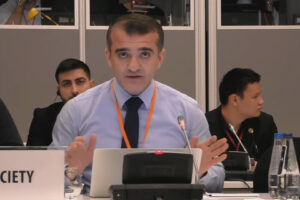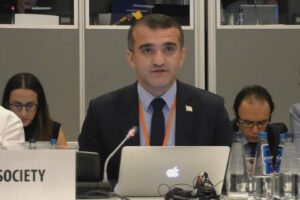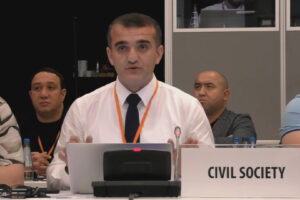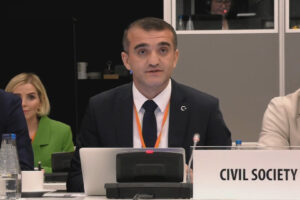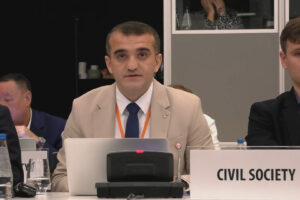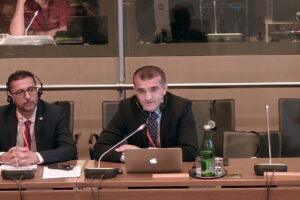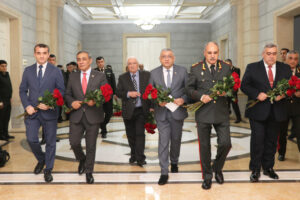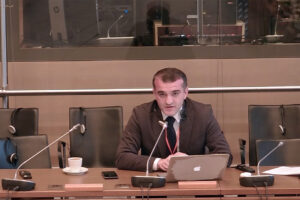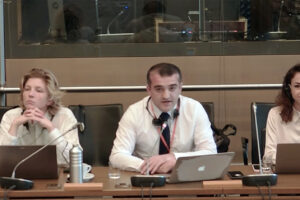Democratic forces of Azerbaijan for association with the EU


About a hundred representatives of the democratic community of Azerbaijan signed the Declaration about the attitude of Azerbaijan to the Association Agreement with the European Union. Presentation of the document took place on 23 June at the office IRFS.
Adoption of a declaration dated to the upcoming signing of association agreements with the EU, Ukraine, Moldova and Georgia on June 27. The same proposal is received from the EU and Azerbaijan, but the country’s leadership under various pretexts avoids association with the EU.
According to Jamil Hasanli, the head of the National Council of Democratic Forces (NCDF), after the restoration of independence in 1991, Azerbaijan became a member of the Council of Europe and OSCE electing pro-Western course. However, negative changes in the foreign policy have been observed in the last 10 years with respect to Western structures.
“The Council of Europe, instead adapting Azerbaijan to its rules began , he began to work according to the “rules”of the Azerbaijani authorities,” said Hasanli. As a pretext to evade the EU Association, Baku calls the “Russian threat.”
However, this is based on the desire of the authorities not to carry out inevitable democratic reforms.
The event participants criticized the intention of the official Baku to sign agreement with the EU strategic partnership for modernization. They think that this agreement will not help to eliminate election fraud, monopoly and human rights violations.
Participants also stated the inadmissibility of Azerbaijan’s joining the Eurasian Economic Union, as it does not promise any prospects for the country.
“The fact that Azerbaijan still has not joined the WTO is a consequence of protection monopolitical interests of olygarchs,” said the leader of the Popular Front, Party Ali Kerimli.
It was also noted that under the rules of the current regime, one should not expect full integration of Azerbaijan to the EU. However, there was a call to the authorities to sign an association agreement with the EU, and not to bring the repetition of Ukrainian events in Azerbaijan.
Democratic forces of Azerbaijan for association with the EU
 23 June 2014
23 June 2014

About a hundred representatives of the democratic community of Azerbaijan signed the Declaration about the attitude of Azerbaijan to the Association Agreement with the European Union. Presentation of the document took place on 23 June at the office IRFS.
Adoption of a declaration dated to the upcoming signing of association agreements with the EU, Ukraine, Moldova and Georgia on June 27. The same proposal is received from the EU and Azerbaijan, but the country’s leadership under various pretexts avoids association with the EU.
According to Jamil Hasanli, the head of the National Council of Democratic Forces (NCDF), after the restoration of independence in 1991, Azerbaijan became a member of the Council of Europe and OSCE electing pro-Western course. However, negative changes in the foreign policy have been observed in the last 10 years with respect to Western structures.
“The Council of Europe, instead adapting Azerbaijan to its rules began , he began to work according to the “rules”of the Azerbaijani authorities,” said Hasanli. As a pretext to evade the EU Association, Baku calls the “Russian threat.”
However, this is based on the desire of the authorities not to carry out inevitable democratic reforms.
The event participants criticized the intention of the official Baku to sign agreement with the EU strategic partnership for modernization. They think that this agreement will not help to eliminate election fraud, monopoly and human rights violations.
Participants also stated the inadmissibility of Azerbaijan’s joining the Eurasian Economic Union, as it does not promise any prospects for the country.
“The fact that Azerbaijan still has not joined the WTO is a consequence of protection monopolitical interests of olygarchs,” said the leader of the Popular Front, Party Ali Kerimli.
It was also noted that under the rules of the current regime, one should not expect full integration of Azerbaijan to the EU. However, there was a call to the authorities to sign an association agreement with the EU, and not to bring the repetition of Ukrainian events in Azerbaijan.
 @
@










